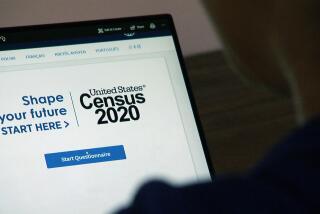Blacks Aren’t Hogging Postal Service Jobs : Race relations: The claim that Latinos are unfairly underrepresented misstates the facts and ignores history.
- Share via
Are African Americans overrepresented in the Postal Service?
Dr. Tirso del Junco, vice chairman of the U.S. Postal Service Board of Governors (and chairman of the California Republican Party), seems to think so. His recent comments struck a raw nerve in the African American community.
Del Junco’s suggestion that this overrepresentation of blacks and accompanying underrepresentation of Latinos is driven by local black postal executives further chafes the injury. His comments indicate an insensitivity to the economic aspirations and well-being of black America. While there is much to be done to increase the representation of Latinos in the Postal Service and other parts of the public sector, it is a false and inflammatory step to begin by portraying African Americans as the unfair beneficiaries and the cause of Latinos’ underrepresentation.
The public sector and the Postal Service in particular played an important role in providing whatever economic stability the black community had before the civil-rights movement. Starting with the Depression, blacks found that the Postal Service was the only place that rewarded “merit” and where racial bias was minimal. The Civil Service examination for postal work enabled the best and brightest of blacks to shine and move up the eligibility list toward employment.
For blacks in the job market during this period, having a college education or an advanced degree meant that more doors were closed in your face than if you were uneducated. The Postal Service became one of the few employers where the skills African Americans mastered in higher education were prized. Thus, on the eve of the civil-rights movement in the ‘60s, more blacks with bachelor’s and graduate and professional degrees were employed by the Postal Service than by any other profession except teaching.
Within the black community, post office work took on an exaggerated status and meaning: It was a “good job.” Compared with most jobs blacks had, the work was steady, the pay good and the benefits excellent. Black postal workers wore their uniforms with pride and people respected them with an honor not afforded in other communities. Yet people also knew that despite their blue-collar status, black postal employees were probably college educated and had earned their job in competition with others. The subtitle of an Ebony article on blacks in the Postal Service captured the national and personal tragedy: “The Graveyard of Negro Talent.”
While the civil-rights movement has leveled the playing field somewhat, it has not completely opened the doors of opportunity for blacks. The post office’s legacy is alive and well in the black community. It is still a “good job.” Taking the Civil Service exam for the Postal Service is a safety valve that educated black Americans still feel they need to have.
Blacks’ success in the post office is related less to racial preference than to the fact that more highly educated blacks continue to take the exam than do their white and Latino counterparts, who bypass these jobs for other more lucrative opportunities. Less-well-educated whites and Latinos therefore lose out in a merit-based exam because they cannot compete with highly educated blacks. The over-representation of blacks in the Postal Service today (blacks hold about 30% of Los Angeles-district postal jobs, while representing about 5% of the labor force; nationally, blacks hold about 11% of postal jobs and represent about 5% of the labor force) is thus just a continuing reminder that blacks have not found the doors of opportunity completely open to them in other sectors of the economy.
What is most dismaying in Del Junco’s comments, and in the whispers in the air among other Latino leaders, is the way in which blacks are increasingly being perceived as the prime culprits in Latino underrepresentation in the public sector. The public sector has a special historical and contemporary meaning to the economic well-being of the black community that should be the basis of this discussion.
The inclusive solution to these problems is to promote the expansion of employment in the public sector to accommodate the growing needs--for education, recreation, health, community safety--that a diverse population generates. This means we must support the expansion of taxes to meet these needs, including a change in public spending priorities. Rather than seeking more and more money to put youths in prison, we need to spend to educate them. And we need to work for the defeat of measures like the “Save Our State” initiative, which would take away public services important to needy communities.
Only by ensuring that public policy fairly includes all people will we escape the racial divisiveness that Del Junco’s comments tend to generate.
More to Read
Sign up for Essential California
The most important California stories and recommendations in your inbox every morning.
You may occasionally receive promotional content from the Los Angeles Times.










